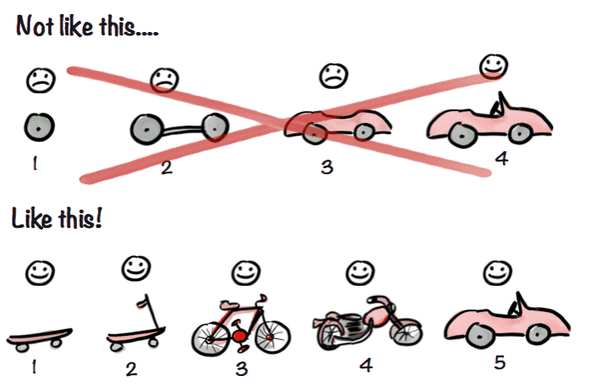August 22, 2019 • ☕️ 5 min read
Updated: 12/12/2019, 12:45:39 AM

TLDR: I'm pivoting.

I've always wanted to have my own lil' corner on the web. A spot to show off my accomplishments and projects, share knowledge and insights, occasionally blog, and house my portfolio. About two weeks ago, August 8th to be exact, I pulled the trigger and bought my domain, codyaprice.com, from Google Domains. After that, I needed a way to deploy it. I had heard great things about zeit and gave them a shot (can't recommend them enough btw!). So, within fifteen minutes and twelve dollars later, I had a domain and deployment/cdn service. Awesome!

GET /framework
A few weeks before I got my itchy trigger finger, I found @Rich_Harris' talk about rethinking reactivity and fell in love with svelte. This is what a UI framework should be!
Don't get me wrong, I love React. I love how easy it is to create beautiful and flexible interfaces with a declarative, straightforward approach. I love working with ES2015+ JavaScript and it has somehow become the language I think in. My pseudocode is pretty much JS now. However, it's always bothered me that you have to include the universe with any React app, while reconciliation and the virtual DOM ain't free.

React needs to figure out how to efficiently update the UI to match the most recent tree...[and] implements a heuristic
O(n)algorithm.
The virtual DOM is
pure overhead!
Reconciliation is at least O(n) and runs on each render cycle. It's true
that, in general, React apps can consistently output 60 fps, but surely we can
do better than O(n) on top of what the browser already does and giant chunks
of JavaScript runtime right?
So back to svelte. What drew me to svelte was that it is component based, not unlike React, and compiled to just JavaScript without polluting your bundle with production dependencies. It builds fast, ships fast, and runs fast. It's got a beautiful API and is performant enough to run on embedded devices!
That's incredible. I mean, I went to school for Electrical and Computer Engineering and cut my programming teeth on C and microcontrollers. Before becoming a full time web developer, I was an Embedded Systems Engineer who worked on extremely memory-and-power-constrained microprocessors. Some of them had 32kB of memory, operated at 32MHz on a good day, and didn't even have a heap! We did everything on the stack 📚! So, with that background, I can confidently say that by definition, I'm a perf nerd 🤓.
I was sold enough on svelte to use zeit's sapper template. At least at first.
Float Like a Rock, Sting Like a Fly
As I've said before, I basically live and breathe React. I write it M-F 9-5 @cerner. So, transitioning to svelte was slow. Even though it's similar to React and has a similar development mouthfeel, it's still different. There's a small learning curve and there's not nearly as much community support (yet). This isn't svelte's fault, but it plays a factor in how fast I can iterate on features and development for my website.
Why is nobody talking about the mouth feel
— die hardelf (@veneficaultrix) June 2, 2018
At the beginning of this post, I mentioned what I want my website to contain: blog posts, tutorials and knowledge sharing, projects, portfolio, content, etc. Blog posts are great to pad websites with when fresh. Generally, they're just text and images. Simple content. Being that I write a lot of documentation in markdown, I wanted to be able to write my posts in markdown and then have a build time pipeline that renders them to markdown. I also wanted syntax highlighting for code snippets, since a lot of what I have to share is code-centric. So, I found prism for syntax highlighting and unified for markdown to html parsing and conversion (and so much more). Both of these tools are incredible, but there isn't a first class solution or plugin for sapper. And I fought with getting prism to work properly with svelte since css modules are a first class feature and on by default (one of the things I love about svelte). I worked on this in my spare time for nearly two weeks without producing nor hosting any meaningful content.

I was getting kind of frustrated and felt like I wasn't moving fast enough. I just wanted to start with my medium articles and go from there. I needed some help and perhaps some guidance. When I woke up yesterday around 6am, I opened twitter on my phone and at the top of my feed was a @ken_wheeler tweet:
The best practice is shipping
— NAUGHTY LIST VETERAN (@ken_wheeler) August 20, 2019
And that's when I decided I needed to move on from svelte and sapper.
Great Gatsby
“And so with the sunshine and the great bursts of leaves growing on the trees, just as things grow in fast movies, I had that familiar conviction that life was beginning over again with the summer.”
-F. Scott Fitzgerald, The Great Gatsby
I can ship something that is good enough now and iterate on it quickly. If I use what I'm familiar with and make my content framework agnostic, I can produce a working, non-naked website while leaving the future open for change. So, making like Sony with Spiderman, I rebooted my website repo using the Gatsby starter blog template. All it took was:
gatsby new codyaprice.com https://github.com/gatsbyjs/gatsby-starter-blogand I was up and running 🏃♂️. Even though svelte is more performant than React, my development agility suffered when using it. Gatsby may take significantly longer at build time than svelte, but I had my first Medium article self-hosted and deployed faster than I could with native sapper. That's extremely valuable. And so far, there's no reason to complain. Now I'm freed up to focus on adding features that matter, like post tags and categories, side/secondary navigation, and other routes.
Closing Remarks
It's best to deliver as quick and as often as possible. A boss of mine has this cartoon pinned on his office door and I think it's a perfect metaphor for this:

In this scenario, you develop, ship, and demo to the client over and over (iterate) until you arrive at what they want. The key is speed and you can't go fast without the right support and tools. For me, that's React and Gatsby. For now.
In one of Rich Harris' tweet threads about his rethinking reactivity talk, he explains the ideas behind what makes svelte so great. Dan Abramov replied with some insights into what's to come with React + Suspense and the caveats/ nuances of his incredible and jaw-dropping jsconf Iceland talk. Sounds like React, like JavaScript, will be a safe bet for the near future.
Svelte is probably better, I don’t know but I’m pretty sure it is. But
— Horse JS (@horse_js) August 22, 2019
That being said, I believe that the direction svelte took is the future of web development. In my spare time, I can revisit using svelte and sapper. Maybe they'll have more support and features by then? Maybe then I'll have enough time and experience to roll my own solutions that mimic what the Gatsby starter blog gives you out of the box. 🤷♂️
I'm still working on my personal website, but it's deployed live now and it has
(some) content on it. I can quickly add more without fighting a learning curve
and that's the most important thing right now. Who knows, maybe React and
Gatsby will satisfy my needs for years to come? One thing's for sure, knowing
the JavaScript scene, there will always be a new hot thing to try out. Today
it's svelte, tomorrow it's ${hotNewJavaScriptFramework}. As long as I'm
learning and growing along the way, that's all I can ask for!
Thanks for reading! ✌️